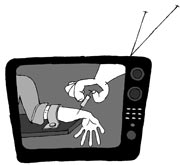THE UPCOMING MAY 16 execution of Timothy McVeigh promises to be one of the most repulsive, sickening media spectacles in the modern history of a country numbed by them.
It’s hard to imagine a more fitting candidate for the first execution under modern federal death penalty statutes. (The last federal execution was in 1963; most crimes now punishable by death through federal statutes are drug offenses.) McVeigh is perfect: an unrepentant mass murderer going to his grave believing himself not only justified but a hero.
His martyrdom will only seal that image for his twisted admirers. And that is the least of many disturbing aspects of the execution of Timothy McVeigh, and, by extension, all state executions.
There is, quite simply, no good reason for the death penalty—not moral, not legal, not preventative, none. And there are a staggering number of reasons it’s wrong.
First, consider what the death penalty doesn’t do. Countless independent studies have shown that it doesn’t prevent or deter the crimes it’s applied to. More studies have shown that it doesn’t save money; the years of legal procedures involved are far more expensive than a lifetime of prison without parole. It doesn’t actually punish a person nearly as much as a long, pointless life in a cage. It does nothing to bring “closure” to a victim’s loved ones; killing one person doesn’t bring anyone else back, in Oklahoma or anywhere else, and it certainly doesn’t end the grieving over their loss.
State murder does, however, ensure that if the person being executed is innocent, he or she won’t come back from the grave, either. When Republican governor George Ryan of Illinois instituted a moratorium on his state’s death penalty in 1999, it wasn’t for ideological reasons. It was because over half of the prisoners on his state’s death row had been exonerated of their crimes, many by amateur investigators.
The application of the death penalty in the United States is not random; it selects for people of color and the poor, the defendants least sympathetic to jurors and least capable of affording competent lawyers—the anti-O.J.s. Beyond that, it’s hard to discern much of a pattern; perpetrators of far more heinous crimes not only avoid the death penalty but, in some cases, walk the streets again. It’s a crapshoot, as any prosecutor will tell you and any state’s death row population will confirm.
VENGEANCE IS OURS
If the death penalty doesn’t deter, doesn’t save money, and doesn’t serve justice, what does it do? The answer is fairly obvious: The death penalty in the U.S. is all about vengeance. It’s about feeling good that we murdered the bastard. This will be on full display with endless, nauseating blood-lust interviews with Oklahoma City victims’ family members in the coming days. Chances are we’ll only hear the ones who say the right things; others, like Bud Welch, an Oklahoma City gas station owner who has toured the country arguing passionately against the death penalty, will probably not make the Today Show. Here’s Welch on McVeigh: “The execution of Timothy McVeigh will not bring back Julia [his daughter] or her colleagues, nor will it end the grieving for any one of the victims. Revenge and hate are the reasons 168 people died that day in 1995. I oppose the death penalty absolutely, in all cases, because it is [always] an act of revenge and hatred.”
As public policy, there is only one possible word for laws that murder people as a societal catharsis: barbaric. The U.S.’s fixation with capital punishment—we execute far more people than any other country—puts us in a lonely, exclusive class with human rights pariahs like China, Iran, Libya, and North Korea. The U.S. is one of the only democracies in the world that executes people.
Self-identified Christians who, despite the injunction “Thou shalt not kill,” love the modern death penalty, are a peculiarly American phenomenon. George W. Bush was elected (sort of) president of the United States in large part because he was seen as more “moral” than his predecessor, Bill Clinton—even though he had signed off on state murder every single time he was given the chance, over 160 times, no matter how shaky the evidence of guilt. Clinton only executed the retarded. Dubya, a man born so privileged that he has never had to answer for the consequences of his actions, not only executed the retarded, but also mocked a victim’s pleas for survival. This, in America, is moral progress.
But we all know, at some level, that the death penalty is wrong. That’s why we try, very hard, to feel good about it. That’s why we execute people in secret, at night. That’s why states endlessly search for more “humane” methods of murder. That’s why vengeful family members of a victim get so much airtime, and the family of the person being executed with your tax dollars gets none. That’s why the murder of Timothy McVeigh will be a circus.
Perhaps the U.S. has made the process sufficiently sanitized, and we are sufficiently anesthetized, that soon we will be allowed to watch and rejoice. If not with McVeigh, then soon, executions will be Webcast, maybe even televised—the progress of 21st-century science used to display a social practice, public executions, that reverts to the 19th century, the 14th, the 2nd.
The cold-blooded, carefully planned, and widely anticipated murder of Timothy McVeigh will be a new standard in the genre. But that’s only one of countless reasons why it’s wrong— for McVeigh or anyone else. Among those reasons are thousands of names, and gravesites, and grieving families. Capital punishment is both a moral horror and a travesty of justice; for all of our sakes, it must be abolished.







